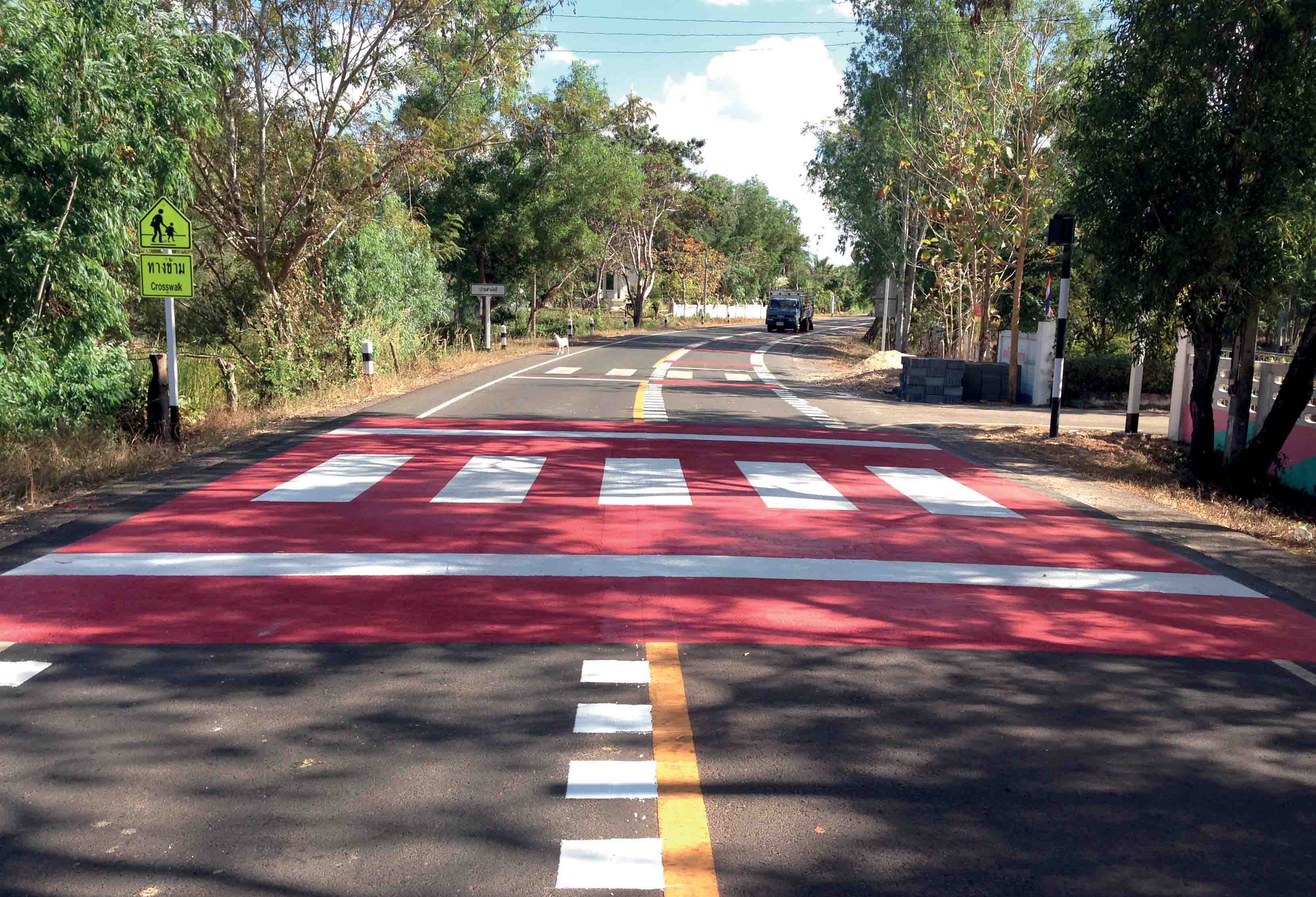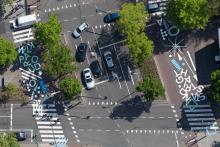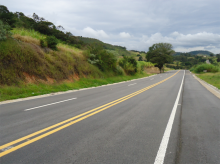The Department of Rural Roads, Thailand (DRR) was rewarded for a comprehensive road safety initiative around schools, especially in rural areas. The award ceremony was held in the IRF offices in Geneva
According to the World Health Organisation (WHO), Thailand ranks among the countries with the highest number of traffic fatalities/ capita. In 2015, the country saw a road death rate of 36.2/100,000 of population. With this, Thailand ranked second in fatal traffic crashes worldwide and its situation regard

Safe zones around schools in Thailand could help reduce the casualty toll amongst the young
RSSThe Department of Rural Roads, Thailand (DRR) was rewarded for a comprehensive road safety initiative around schools, especially in rural areas. The award ceremony was held in the IRF offices in Geneva (1201 IRF Geneva)
According to the World Health Organisation (WHO), Thailand ranks among the countries with the highest number of traffic fatalities/ capita. In 2015, the country saw a road death rate of 36.2/100,000 of population. With this, Thailand ranked second in fatal traffic crashes worldwide and its situation regarding vulnerable road users is of concern. Many of the roads in Thailand, especially in rural areas, are suffering from poor pedestrian safety conditions. Footpaths have not been built and pedestrians are forced to walk on dirt, unsafe paths, and so easily exposed to severe or fatal road accidents. Risks are very high around school zones.
Investigations have shown that pedestrian accidents mostly involve small and teenaged school children and that most accidents occur in the afternoon between 16.00 and 18.00, which coincides with school finishing time in Thailand. Encouraged by the attention created by the UN Decade of Action for Road Safety on this problem, the Department of Rural Roads (DRR) of Thailand decided to launch a programme to reduce the number of crashes around school zones. DRR began with a pilot project at Nonthaburi province in 2013. Beside implementing and enforcing speed limitations, visual communication to create awareness was identified as a key tool for the success of the project.
By using warning signs, warning lights, coloured anti-skid rumble strips and zebra crossings based on MMA cold plastic road markings, the attention of motor vehicle drivers to students, pedestrians and cyclists could be raised successfully. Road users are now guided smoothly and safely through the school areas. The project in fact not only provides visual awareness for drivers, it also acts as a pedestrians’ guide to the benefit of the students' safety. Surveyed students and parents strongly agree that the installation makes the way to and from school safer.
Since its implementation in 2013, DRR has been monitoring the crash rates, anti-skid performance, visibility and erosion of their road safety materials. All results measured are still above standard. Until now, DRR has accounted zero accidents, and the MMA cold plastic-based road markings remain 100 percent durable and functional even after three years, with no maintenance required. That is why the authority not only appreciates the increase in the safety of their pedestrian or biking communities, but also the cost-effectiveness and durability of the solution.
With such a successful outcome of the project, this innovative, sustainable and environmentally-friendly solution has already been applied countrywide across more than 700 schools, and will be extended to 3,000 rural schools in all provinces in Thailand in the near future.
Besides providing safe infrastructure, another pillar of the UN Decade of Action for Road Safety is the development of comprehensive programs to improve road user behavior. In addition to improving school zones infrastructure with better markings, the DRR has also started an extensive educational program in the concerned schools.
The programme 'Safety school - without accident for Thai students' shall cultivate the consciousness for road safety of more than 800,000 students. Trained and experienced road safety specialists, educated students and volunteers equipped with reflective vests ensure safe operations in the morning and evening when school starts and ends. Started in 2016, the '4009 Evonik Road Safety Award' is designed to support sustainable road safety initiatives, as part of the company’s' corporate and social responsibility. It acknowledges and rewards the contributions to road safety of public authorities worldwide.
The prize is bestowed by Evonik upon identification of the winner by an independent jury of internationally recognised experts in the field of road safety, transport, and city design; among others from the International Road Federation (IRF) Geneva. Key criteria for the winning project/initiative are its contribution to road safety and sustainability as well as its innovative character and potential replicability. The Evonik Road Safety Award is endowed with €10,000. This year’s winner, DRR Thailand, has asked to donate the amount to Queen Sirikit National Institute of Child Health as part of their projects' objective to enhance child and adolescent safety in the country.
Submissions for the 2017 award will open in April. For more information, please contact Susanna Zammataro, IRF executive director at [email protected]
According to the World Health Organisation (WHO), Thailand ranks among the countries with the highest number of traffic fatalities/ capita. In 2015, the country saw a road death rate of 36.2/100,000 of population. With this, Thailand ranked second in fatal traffic crashes worldwide and its situation regarding vulnerable road users is of concern. Many of the roads in Thailand, especially in rural areas, are suffering from poor pedestrian safety conditions. Footpaths have not been built and pedestrians are forced to walk on dirt, unsafe paths, and so easily exposed to severe or fatal road accidents. Risks are very high around school zones.
Investigations have shown that pedestrian accidents mostly involve small and teenaged school children and that most accidents occur in the afternoon between 16.00 and 18.00, which coincides with school finishing time in Thailand. Encouraged by the attention created by the UN Decade of Action for Road Safety on this problem, the Department of Rural Roads (DRR) of Thailand decided to launch a programme to reduce the number of crashes around school zones. DRR began with a pilot project at Nonthaburi province in 2013. Beside implementing and enforcing speed limitations, visual communication to create awareness was identified as a key tool for the success of the project.
By using warning signs, warning lights, coloured anti-skid rumble strips and zebra crossings based on MMA cold plastic road markings, the attention of motor vehicle drivers to students, pedestrians and cyclists could be raised successfully. Road users are now guided smoothly and safely through the school areas. The project in fact not only provides visual awareness for drivers, it also acts as a pedestrians’ guide to the benefit of the students' safety. Surveyed students and parents strongly agree that the installation makes the way to and from school safer.
Since its implementation in 2013, DRR has been monitoring the crash rates, anti-skid performance, visibility and erosion of their road safety materials. All results measured are still above standard. Until now, DRR has accounted zero accidents, and the MMA cold plastic-based road markings remain 100 percent durable and functional even after three years, with no maintenance required. That is why the authority not only appreciates the increase in the safety of their pedestrian or biking communities, but also the cost-effectiveness and durability of the solution.
With such a successful outcome of the project, this innovative, sustainable and environmentally-friendly solution has already been applied countrywide across more than 700 schools, and will be extended to 3,000 rural schools in all provinces in Thailand in the near future.
Besides providing safe infrastructure, another pillar of the UN Decade of Action for Road Safety is the development of comprehensive programs to improve road user behavior. In addition to improving school zones infrastructure with better markings, the DRR has also started an extensive educational program in the concerned schools.
The programme 'Safety school - without accident for Thai students' shall cultivate the consciousness for road safety of more than 800,000 students. Trained and experienced road safety specialists, educated students and volunteers equipped with reflective vests ensure safe operations in the morning and evening when school starts and ends. Started in 2016, the '
The prize is bestowed by Evonik upon identification of the winner by an independent jury of internationally recognised experts in the field of road safety, transport, and city design; among others from the International Road Federation (IRF) Geneva. Key criteria for the winning project/initiative are its contribution to road safety and sustainability as well as its innovative character and potential replicability. The Evonik Road Safety Award is endowed with €10,000. This year’s winner, DRR Thailand, has asked to donate the amount to Queen Sirikit National Institute of Child Health as part of their projects' objective to enhance child and adolescent safety in the country.
Submissions for the 2017 award will open in April. For more information, please contact Susanna Zammataro, IRF executive director at [email protected]







